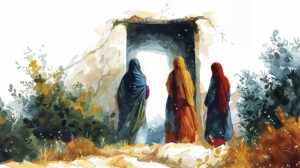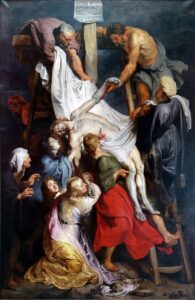But he said to him, “If they do not hear Moses and the prophets, neither will they be persuaded though one rise from the dead.”
—Jesus, in Luke 16:31—
Key point: God’s plan of salvation always involved Jesus: His sinless life, His sacrificial death, His burial, and His resurrection. While we can be grateful the New Testament affirms all of these, the Old Testament affirms them them as well — even Jesus’ resurrection, centuries before it happened.
In Luke 24:13-35, we read that later “that same day” — the very day several of Jesus’ followers (first certain women, then the apostles) learned that Jesus’ tomb was empty and heard that He’d risen from the dead —
2413 two of them were traveling…to a village called Emmaus, which was seven miles from Jerusalem. 14 And they talked together of all these things which had happened. 15 So it was, while they conversed and reasoned, that Jesus Himself drew near and went with them. 16 But their eyes were restrained, so that they did not know Him.
17 And He said to them, “What kind of conversation is this that you have with one another as you walk and are sad?”
18 Then the one whose name was Cleopas answered and said to Him, “Are You the only stranger in Jerusalem, and have You not known the things which happened there in these days?”
19 And He said to them, “What things?”
So they said to Him, “The things concerning Jesus of Nazareth, who was a Prophet mighty in deed and word before God and all the people,
Cleopas and the other disciple went on to speak of their hope that Jesus “was going to redeem Israel” (v. 21), but that He’d been condemned to die and had been crucified. Yet that very morning, they explained, several women who’d supported and followed Jesus found His tomb empty and heard angels report He’d risen from the dead.

Hearing the women’s reports, several more of Jesus’ followers “went to the tomb and found it just as the women had said; but Him they did not see” (v. 24). Initially even the apostles were skeptical (see vv. 10-11); but, as verse 24 indicates, their own investigations (including that of Peter, who is named specifically in verse 12) validated the women’s claims.
Jesus continued to walk with the two, but they still didn’t recognize Him. He rebuked them gently for their lack of faith:
25“O foolish ones, and slow of heart to believe in all that the prophets have spoken! 26 Ought not the Christ to have suffered these things and to enter into His glory?” 27 And beginning at Moses and all the Prophets, He expounded to them in all the Scriptures the things concerning Himself.

Remember that “the Scriptures” referred to the Old Testament, since the New Testament hadn’t yet been written. Later, after arriving at Emmaus, Jesus sat down to eat with them. He “took bread, blessed and broke it, and gave it to them. Then their eyes were opened and they knew Him; and He vanished from their sight” (vv. 30-31). They’d realized who He was at last! They’d talked to Him and enjoyed fellowship with Him! Yes, He indeed had risen from the dead! The two said to each other, “Did not our heart burn within us while He talked with us on the road, and while He opened the Scriptures to us?’” (v. 32).
These two followers of Jesus wasted no time but immediately made their way back to Jerusalem. They found the apostles and those gathered together with them and confirmed the reports of Jesus resurrection. Jesus immediately appeared to them. The interaction between Jesus and the disciples in verses 36-43 indicates clearly the Lord’s followers never dreamed Jesus would rise from the dead, despite the fact Jesus repeatedly had told them He would (more about this in part 2). Then Jesus
44 said to them, “These are the words which I spoke to you while I was still with you, that all things must be fulfilled which were written in the Law of Moses and the Prophets and the Psalms concerning Me.” 45 And He opened their understanding, that they might comprehend the Scriptures.
46 Then He said to them, “Thus it is written, and thus it was necessary for the Christ to suffer and to rise from the dead the third day, 47 and that repentance and remission of sins should be preached in His name to all nations, beginning at Jerusalem. 48 And you are witnesses of these things.
God Had Revealed The Truth About His Plan of Salvation in Scripture Centuries Earlier
Note carefully what Luke tells us in verses 25-27, 32, and 44-46 of Luke 24:
25 Then He said to them, “O foolish ones, and slow of heart to believe in all that the prophets have spoken! 26 Ought not the Christ to have suffered these things and to enter into His glory?” 27 And beginning at Moses and all the Prophets, He expounded to them in all the Scriptures the things concerning Himself.…
32 And they said to one another, “Did not our heart burn within us while He talked with us on the road, and while He opened the Scriptures to us?”…
44 Then He said to them, “These are the words which I spoke to you while I was still with you, that all things must be fulfilled which were written in the Law of Moses and the Prophets and the Psalms concerning Me.” 45 And He opened their understanding, that they might comprehend the Scriptures.
46 Then He said to them, “Thus it is written, and thus it was necessary for the Christ to suffer and to rise from the dead the third day,
Let’s consider seven points — four in this article and the remaining three in Part 2.
First, Jesus lovingly challenged the two disciples as He traveled with them to Emmaus, saying, “O foolish ones, and slow of heart to believe in all that the prophets have spoken!” The prophets words were destined to be fulfilled. Jesus asked them rhetorically, “Ought not the Christ to have suffered these things and to enter into His glory?” Similarly, to the second group, Jesus offered a loving reprimand wrapped in reassurance.
Second, Jesus “expounded to them in all the Scriptures” (v. 27, also see vv. 44,45,46). God has revealed Himself in both the written Word — the Bible — and the Living Word — Jesus. Although Jesus is God’s ultimate revelation of Himself, for He is God, Scripture and the Lord Jesus Christ are equally authoritative. The Bible affirms Jesus’ authority, and Jesus upheld the authority of the Scriptures. Go here learn of some of the many instances in the Gospels in which Jesus pointed to the Scriptures, affirming them and upholding them decisively and without question.
Third, Jesus “expounded to them in all the Scriptures the things concerning Himself” (v. 27, also see v. 44). This should not surprise us, because the Scriptures are all about Jesus. Jesus Himself said so. In John 5:39-40, He told the Jews who were opposing Him, “You search the Scriptures, for in them you think you have eternal life; and these are they which testify of Me. But you are not willing to come to Me that you may have life.” There were other statements Jesus made that align perfectly with this one. Yes, Jesus had things to say (and surprising things at that) about how to live and how to treat others, but the main focus of His teachings was Himself, who He was and is.
Fourth, obviously, “the things concerning Himself” included His resurrection (see v. 46). In part 2, we will examine at ten specific Old Testament passages that either imply or indicate with a good deal of clarity that the Messiah would rise from the dead, but here I want to zero in on one that is especially powerful. Jonah 1:17 is tied to a real event in world history. Jesus alluded to this passage and explicitly mentioned the event. Moreover, He upheld the event as a picture of His upcoming death, burial, and resurrection. Even His resurrection? Yes, even that!
After Jonah, who had been directed by God to go to Nineveh and warn its inhabitants of coming judgment, received his instructions from the Lord, he rebelled. He headed away from Nineveh, and purchased passage on a ship to Tarshish. When Jonah’s “ship was about to be broken up” by a storm God had sent (Jonah 1:4) and the seamen couldn’t get control of their vessel, Jonah admitted he was running from God and suggested they throw him overboard. Reluctantly, they did so, and the sea became calm. Jonah’s shipmates “feared the Lord exceedingly, and offered a sacrifice to the Lord and took vows” (v. 16).
God was merciful to the crew of the ship — and to Jonah as well. Verse 17 tells us, “Now the LORD had prepared a great fish to swallow Jonah. And Jonah was in the belly of the fish three days and three nights.” Jonah survived. He prayed from inside the fish, and “the LORD spoke to the fish, and it vomited Jonah onto dry land.” This stubborn prophet learned his lesson and preached to the people of Nineveh, and they repented.

Centuries later, when the scribes and Pharisees asked Jesus for a sign that would validate Him and His ministry, Jesus replied, “An evil and adulterous generation seeks after a sign, and no sign will be given to it except the sign of the prophet Jonah. For as Jonah was three days and three nights in the belly of the great fish, so will the Son of Man be three days and three nights in the heart of the earth.”

The reckoning of “three days and three nights” was different in that culture than it is in ours. Jesus died on a Passover Friday and emerged alive from a borrowed tomb on the following Sunday. “Three days and three nights” is a window of time between involving at least portions of each of three days.
Make sure, though, that you don’t get sidetracked.
- Jonah, who wound up “in the belly of the fish” because he’d blatantly disobeyed God, emerged from it alive. God was merciful and gracious to him.
- Jonah’s experience foreshadowed that of Jesus, who was sinless but would wind up dead and buried because He’d willingly paid the price for human sin on a Roman cross. As Jonah emerged from the fish alive, Jesus would emerge from the tomb — “the heart of the earth” — alive, as well!

Jesus not only foretold His resurrection, but He pointed to a specific event in history and a passage from the Old Testament to do it.
Next time, we will see that Jesus spoke to His disciples repeatedly about His upcoming suffering, death, and resurrection. We’ll also examine numerous other Old Testament passages that foretell, either explicitly or implicitly, the Lord’s resurrection. And we’ll highlight the profound impact all of this had on Jesus’ followers when the Master “opened their understanding, that they might comprehend the Scriptures.”
Stay tuned! In a couple of days, I’ll release part 2.
Part 2 is available here.
Copyright © 2024 by B. Nathaniel Sullivan. All rights reserved.
Unless otherwise indicated, Scripture passages have been taken from the New King James Version®. Copyright © 1982 by Thomas Nelson, Inc. Used by permission. All rights reserved.

Be First to Comment